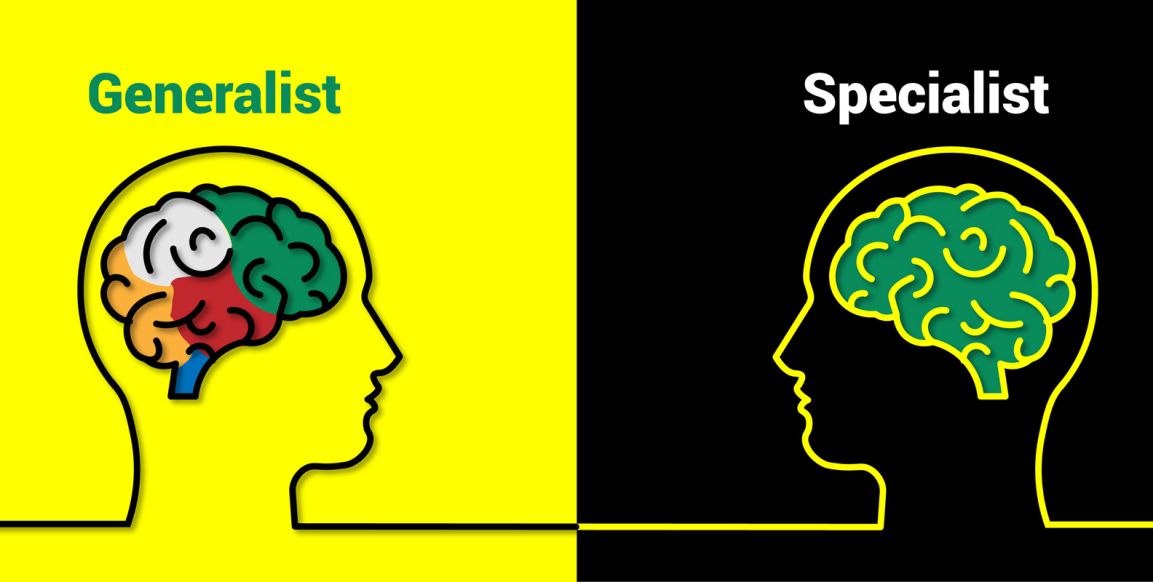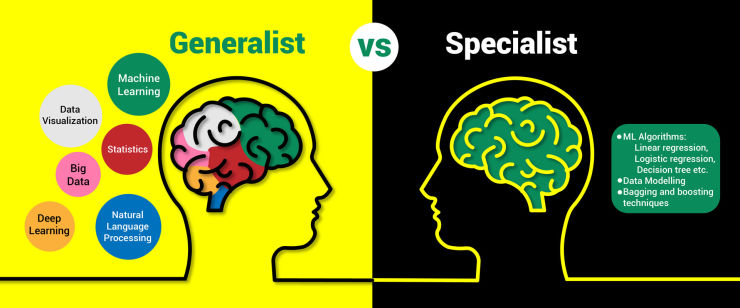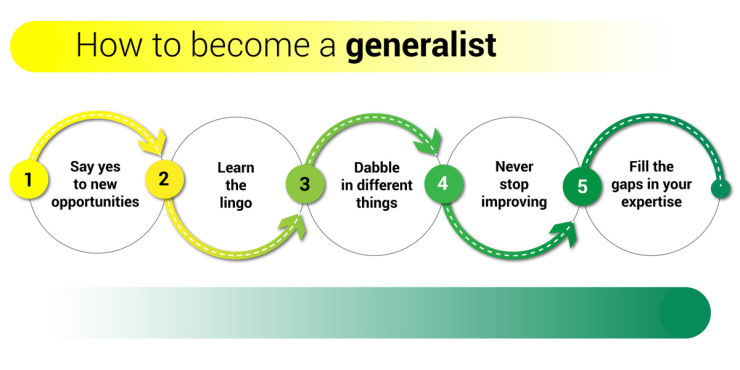
The shift from specialist to generalist
The great debate rages on as to whether it is better to be a generalist or specialist. So which way should you turn in the job market?
To paraphrase the great bard, William Shakespeare, ‘To specialize or not to specialize, that is the question?’ Until recently, people have been led into thinking that if they specialize in a certain field or develop a singular skill set that they will definitely get further ahead of their generalist counterparts in the work environment.
Specialization worked for the Williams sisters. They were trained to be just tennis players, not tennis players, cricketers, and footballers. Thanks to that, they are record holders and millionaires. So why is there now a seismic shift back to people being more of a generalist than a specialist? Sounds completely counterintuitive, but it’s happening at a prolific rate. This begs a further question, why has the pendulum swung in this direction, and further to that, which Nexford degree will help you to attain the skills required to become a true generalist?
Learn how to develop the most in-demand skills for your future career!
Discover how you can acquire the most in-demand skills with our free report, and open the doors to a successful career.
Businesses need generalists
Generalists are generally a jack of all trades and seemingly, on most occasions, masters of all. This of course adds tremendous value to the organization. You may have met them in the work environment. They’re the ones that know their way around a balance sheet, have led creative teams in the pursuit of new business development, and possibly contributed to strategic discussions. For their troubles, they tend to be recognized for promotions and bonuses.
So where do you sign up? As the roles of generalists and specialists can vary within an organization, it is important to carefully consider which route you want to follow. Once you are a plastic surgeon it’s very difficult to become a veterinary surgeon. Specialists often find it difficult to change career paths at a later juncture, whereas generalists can more often than not jump ship and build another career without drowning in a sea of inabilities.

The pros and cons of being a specialist
Specializing in a single subject can have its drawbacks. Generalists have more career options across a host of industries, whilst specialists tend to suffer from career inflexibility. A narrowed focus and expert skills in a particular area mean that a specialist can only find work in a relatively narrow field.
CleverISM, a leading AI-driven job board, maintains that the advantages of being a specialist in your chosen field are first and foremost that you can earn more money even from the outset and wield more power within the organization. But of course, with every pro there must be a con. Being a specialist means that you limit yourself in terms of career flexibility, as more often than not, your narrowed focus means that you can only find work in that field.
Your level of expertise in a certain subject may mean that you are the go-to person for that job title, but when it comes to all other decision-making processes, your opinion may not be valid.
The pros and cons of being a generalist
Hyperconnectivity and a blurring of job roles can make you as a generalist that much more valuable and employable. Think of how the role of a CTO has evolved from just overseeing IT to including the path to total digital transformation. The CTO now fills multiple roles in an organization, so in order to thrive, said person must have the wide skill sets and flexibility to pivot on a penny.
A generalist that has the knowledge to cover a broad range of issues can see deeper inside the interconnectedness and find solutions that a specialist might miss. They can see the bigger picture and come up with solutions that benefit the business as a whole and not just a certain department within it.
Sounds like a win-win for all so what could possibly be the downside? The most common criticism of these individuals is that they sacrifice depth for breadth. Also, as generalists have their fingers in several pies their job security can suffer. Replacing a generalist with another generalist can be easier than replacing a specialist with a specialist.
So, if being a generalist is on the whole more advantageous than being a specialist, how then can you become one? According to Forbes, It’s never too late to become a generalist, even if you’re already well-established in your career. In fact, if you’ve been doing the same type of work for years, committing to becoming a generalist now might be exactly what you need to boost your motivation as well as your skillset. They go on to list five ways to broaden your experience.

How to become a generalist
Say yes to new opportunities
Learn the lingo
Dabble in different things
Never stop improving
Fill the gaps in your expertise
Learn how to develop the most in-demand skills for your future career!
Discover how you can acquire the most in-demand skills with our free report, and open the doors to a successful career.
There is a reason why a DIY expert has a toolbelt
Just as you never see a DIY expert with only a hammer in their toolbelt, so a generalist must add multiple strings to their bow. Carrying a hammer though is not necessarily a problem. It’s just that our world is changing so rapidly that those with more tools in their possession will better navigate the uncertainty.

Many multinational companies such as Google, Facebook, and even some of the largest banks like Chase Manhattan are looking for people with multi-functional experience. In fact, Lisa Stern Hayes, one of Google’s top recruiters, said in a podcast that the company values problem-solvers who have a “general cognitive ability” over role-related knowledge.
She said, “Think about how quickly Google evolves. If you just hire someone to do one specific job, but then the company needs change, we need to be rest assured that the person is going to find something else to do at Google. That comes back to hiring smart generalists.”
They say that the only two things that you can rely on are death and taxes, much of the rest is just a lottery. So, unless you have a crystal ball, or have the powers of a soothsayer, it is widely regarded that you should lean more toward becoming a generalist as time, and changes within it, move very fast.
Ready to become a multi-functional expert? Download our brochure or book a call with our Nexford Advisors!

Mark is a college graduate with Honours in Copywriting. He is the Content Marketing Manager at Nexford, creating engaging, thought-provoking, and action-oriented content.
Join our newsletter and be the first to receive news about our programs, events and articles.